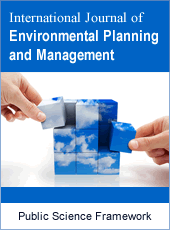International Journal of Environmental Planning and Management
Articles Information
International Journal of Environmental Planning and Management, Vol.2, No.4, Aug. 2016, Pub. Date: Aug. 5, 2016
A Factorial Study of Renewable Energy Technology in Nigeria
Pages: 36-44 Views: 4257 Downloads: 1089
[01]
Igboanugo A. C., Department of Production Engineering, University of Benin, Benin City, Nigeria.
[02]
Kwasi-Effah C. C., Department of Mechanical Engineering, University of Benin, Benin City, Nigeria.
[03]
Ogbeide O. O., Department of Production Engineering, University of Benin, Benin City, Nigeria.
Despite the fact that renewable energy is an important and abundant source of energy in Nigeria, it has attracted neither the requisite level of investment nor tangible policy commitment. The development of policy by government in favor of renewable energy development has a direct bearing with optimal development of its resources. Although the energy reforms and national resources allocated to developing and disseminating renewable energy in the last decades may appear substantial, but the total amount is still insignificant compared to that allocated to the conventional energy sector that service less than 40% of the population. The success of renewable energy technologies has been limited by a combination of factors which include: poor integrated institutional framework; inadequate policy implementation; lack of co-ordination and linkage in renewable energy programmes; pricing distortions which have placed renewable energy at a disadvantage; high initial capital costs of insulation; weak technology dissemination strategies; lack of skilled manpower; poor baseline information on location and weak maintenance service and infrastructure. This paper utilizes a factorial approach to reduce multi-dimensional variables involved in the contemporary issues concerning renewable energy technology in Nigeria. Results showed that renewable energy policy structure, government attitude, clean energy goals, youth empowerment through renewable energy, energy conservation and modus vivendi are critical factors to be considered in order to facilitate renewable energy development in Nigeria.
Renewable Energy, Factorial Analysis, Variables, Government, Policy Development
[01]
Ebunilo P. O and Kwasi-Effah C. C (2013), Solar refrigeration. Discovery Spring Journal, Vol. 1 (1), pp 17-19.
[02]
Okafor E. N and Joe U. (2010). Challenges to development of renewable energy for electricity power sector in Nigeria. International journal of academic research, Vol 2 (2) pp 211-216.
[03]
Onyemaechi C. C (2008). Renewable energy in rural Nigeria. International NGO Journal, Vol. 4 (7), pp 333 336.
[04]
Olagbegi P. O, Kwasi-Effah C. C., Ugbi B. A (2014). Prilimary investigation of the effect of wind speed on the output performance of a wind electric generator. Global Journal of Advanced Engineering Technologies Vol 3, (2) pp 23-28.
[05]
Sambo A. S (2005). Renewable energy for rural development: Nigeria prospective. Journal of science and technology vision. Vol. 1 pp 12-22.
[06]
Olayinka S. O (2010). Energy utilization and renewable energy sources in Nigeria. Journal of Engineering and Applied Sciences, Vol. 5 pp 171-177.
[07]
Aburime, B. A., Kwasi-Effah, C. C. and Egware, O. H. (2013). An experimental study of single surface solar water distiller. International Journal of Engineering and Technology Sciences (IJETS), Vol. 1 (2) pp 34-45.
[08]
Akinbami FK, Illori M. O. Oyebisi, T. O, Akinwunimi I. O and Adeoti O. (2001). Biogas energy use in nigeria. Renewable and sustainable energy reviews, Vol 5. (1) pp 97-112.
[09]
Fabrigar, L., Wegener, D., MacCallum, R., and Strahan, E. (1999). Evaluating the use of exploratory factor analysis in psychological research. Psychological Methods, Vol. 4, pp 272-299.
[10]
Widaman, K. F. (1993). Common factor analysis versus principal component analysis: Differential bias in representing model parameters? Multivariate Behavioral Research, Vol. 28, pp 263-311.

ISSN Print: 2381-7240
ISSN Online: 2381-7259
Current Issue:
Vol. 7, Issue 4, December Submit a Manuscript Join Editorial Board Join Reviewer Team
ISSN Online: 2381-7259
Current Issue:
Vol. 7, Issue 4, December Submit a Manuscript Join Editorial Board Join Reviewer Team
| About This Journal |
| All Issues |
| Open Access |
| Indexing |
| Payment Information |
| Author Guidelines |
| Review Process |
| Publication Ethics |
| Editorial Board |
| Peer Reviewers |


